Annual Report – 2022
ANNUAL REPORT OVERVIEW
Who are we?
The British Columbia Used Oil Management Association (BCUOMA) is a not-for-profit society that operates a province-wide program dedicated to supporting the collection and recycling of lubricating oil, oil filters, oil containers, antifreeze and antifreeze containers, from both the do-it-yourself market as well as the commercial and industrial markets.
Our goal is to provide British Columbians with an eco-friendly and cost-effective way to manage program materials by keeping them out of the environment and managing them at end of life. Each year, approximately 50 million litres of oil and antifreeze are collected and responsibly managed through our program.
Through close collaboration with our key stakeholders, our Association helps prevent automotive fluids and materials from harming the environment and instead, turns them into something useful. Working together we’re improving the environmental and economic outcomes of everyone. It’s what we call moving forward through balance.
What do we do?
Formed under the British Columbia Society Act in 2003, BCUOMA has operated a province-wide collection and recycling program for used oil, oil filters and used oil containers since August 2003 and for antifreeze since 2011. This collection program includes the do-it-yourself market as well as the commercial and industrial markets.
BCUOMA is managed by a multi-sector Board of Directors with representatives from various sectors, including manufacturing, automotive, retail, local government and the public at large. BCUOMA provides incentives to recyclers to ensure that oil, filters, antifreeze, and containers throughout BC are collected and managed. The collectors pick up the materials from generators and publicly accessible recycling centres across the province and deliver the materials to the BCUOMA registered processors, where they are processed to the point that they can be reused or sold as raw material inputs for manufacturing or energy products.
How do we help?
Year over year, we are becoming increasingly aware that throwing away or dumping oil products, not only harms the environment, but also wastes a valuable non-renewable resource. One of the unique features of the BCUOMA program is the significant environmental, economic and social benefits the program delivers. The management of program materials, through partnerships with the registered processors, has the potential to achieve goals and objectives in the areas of sustainability, circular economy, CO2 reductions, carbon offsets, zero waste and pollution prevention.
The BCUOMA program and its partners are an example of how a regulated EPR program can support private sector innovation, using proven technologies, to develop economic growth and support a circular economy here in BC.
What happens to the products collected?
BCUOMA’s mandate is to ensure the responsible collection and management of the used oil, antifreeze, filters and containers required under the BC Recycling Regulation as well as provide British Columbians with an eco-friendly and cost-effective way to dispose of these materials.
Used oil can be re-refined into new lubricating oil or material inputs for manufacturing or energy products. Additionally, used oil filters contain metal, which is recycled into metal products like rebar, nails, and wire. Used oil and antifreeze containers are recycled and used to manufacture new products, including oil containers, drainage tiles, and parking curbs. Used antifreeze is refined and reused as new automotive antifreeze.
LETTER FROM THE CHAIR
On behalf of the BC Used Oil Management Association, I am pleased to present the 2022 Annual Report.
We are very proud that our innovative and successful business model continues to gain recognition around the world. As a global leader in our field, we are always looking for ways to share our successes with others, especially as our industry, and the world at large, begins to recover from the initial impact of the pandemic.
Here at home, we continued to support local governments and municipalities through our grant program. 15 new grants were awarded in 2022, providing the necessary infrastructure and support to help ensure program materials are safely collected and managed. We also provided grants to six communities to help fund local collection events for residents.
Our community engagement team toured the province over the summer, attending eight community events with the goal of educating participants and spectators on BCUOMA and the importance of used oil and antifreeze recycling, and how to find used oil recycling facilities across B.C.
On the international front, our CEO David Lawes was invited to Guayaquil, Ecuador to present at the 1er Encuentro Internacional de Modelos de Economía Circular para la Gestión Integral de Aceites Lubricantes Usados y sus Envases. The event focused on circular economy models for management of used oil and BCUOMA—along with our counterparts from Spain and Portugal—were recognized as global leaders in that area.
Our collection rates, already amongst the highest in the world, remained steady over the past year, thanks to the diligent efforts of collectors, both on the commercial side and throughout our network of free, publicly available facilities.
I am honoured to lead a group of enthusiastic and engaged Board members in representing the interests of our more than 300 members. Their continued commitment to our mandate and vision for the future, both of which are supported by the CEO and Association staff, has me feeling very optimistic and excited about the years ahead.
Brian Ahearn

Board Chair, BCUOMA
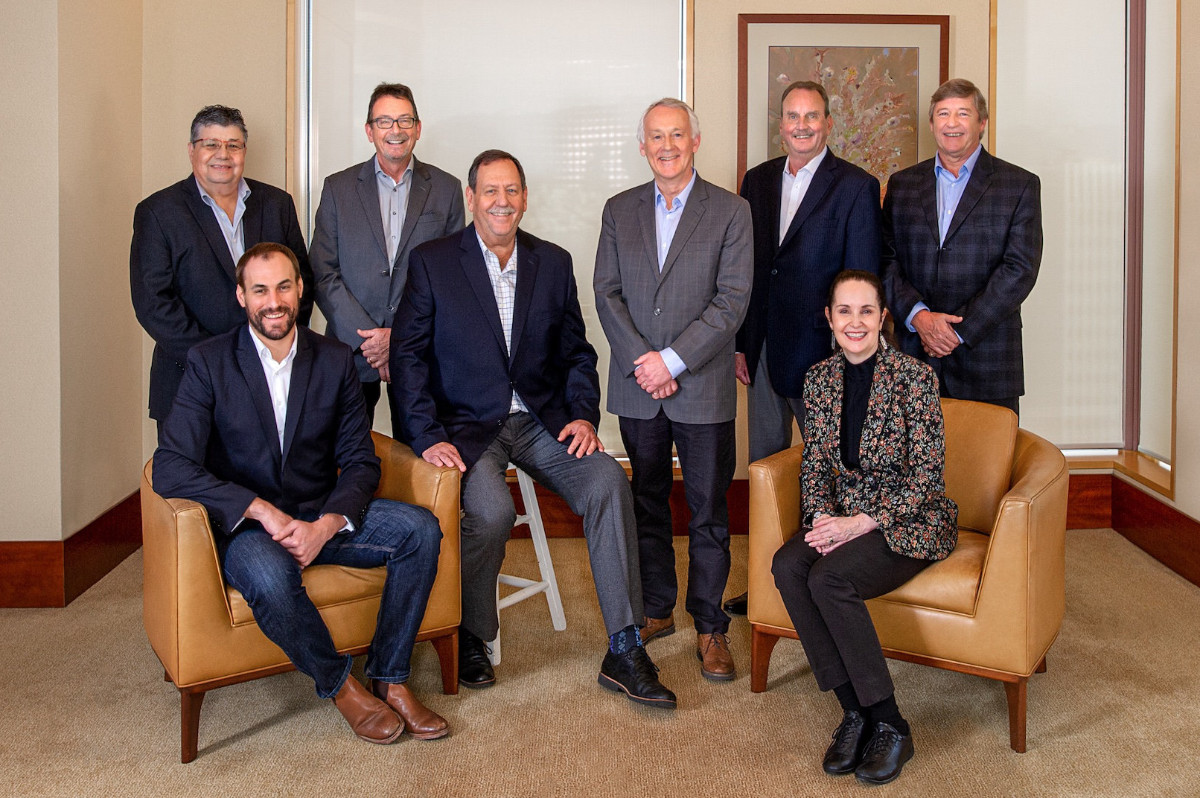
| 2022 BCUOMA BOARD OF DIRECTORS |
|---|
| Brian Ahearn, Chair Oil Industry |
| Lonnie Cole, Secretary Filter Industry |
| Natalie Zigarlick, Treasurer Public Member |
| Don Hetherington Mr. Lube Canada |
| Dan Higgins Canadian Tire |
| Sam DeGuillio Antifreeze Industry |
| Vincent Gauthier Petro-Canada Lubricants Inc. |
| Gord Klassen City of Fort St. John (Not Pictured) |
| Loulia Kouchaji Honda Canada |
| Wayne Marees Oil Industry |
| Andrew McKinnnon Global Automakers of Canada |
LEADERS IN INNOVATION

Adaptability is paramount as we work to ensure the needs and expectations of British Columbians and our key stakeholders are not only met but exceeded.
We see ourselves as leaders of innovation in the area of environmental stewardship, and here are just a few of the ways we have raised the bar:
Educational Video
Used motor oil is the perfect recyclable product. If it’s collected and returned properly, it can be reused again and again. To help share this important message, we created a simple step-by-step video showing just how easy it is to recycle used motor oil.
The video garnered more than 615,000 views and 1.5 million impressions in less than six months, helping many British Columbians learn just how easy it is to do the right thing with their program materials
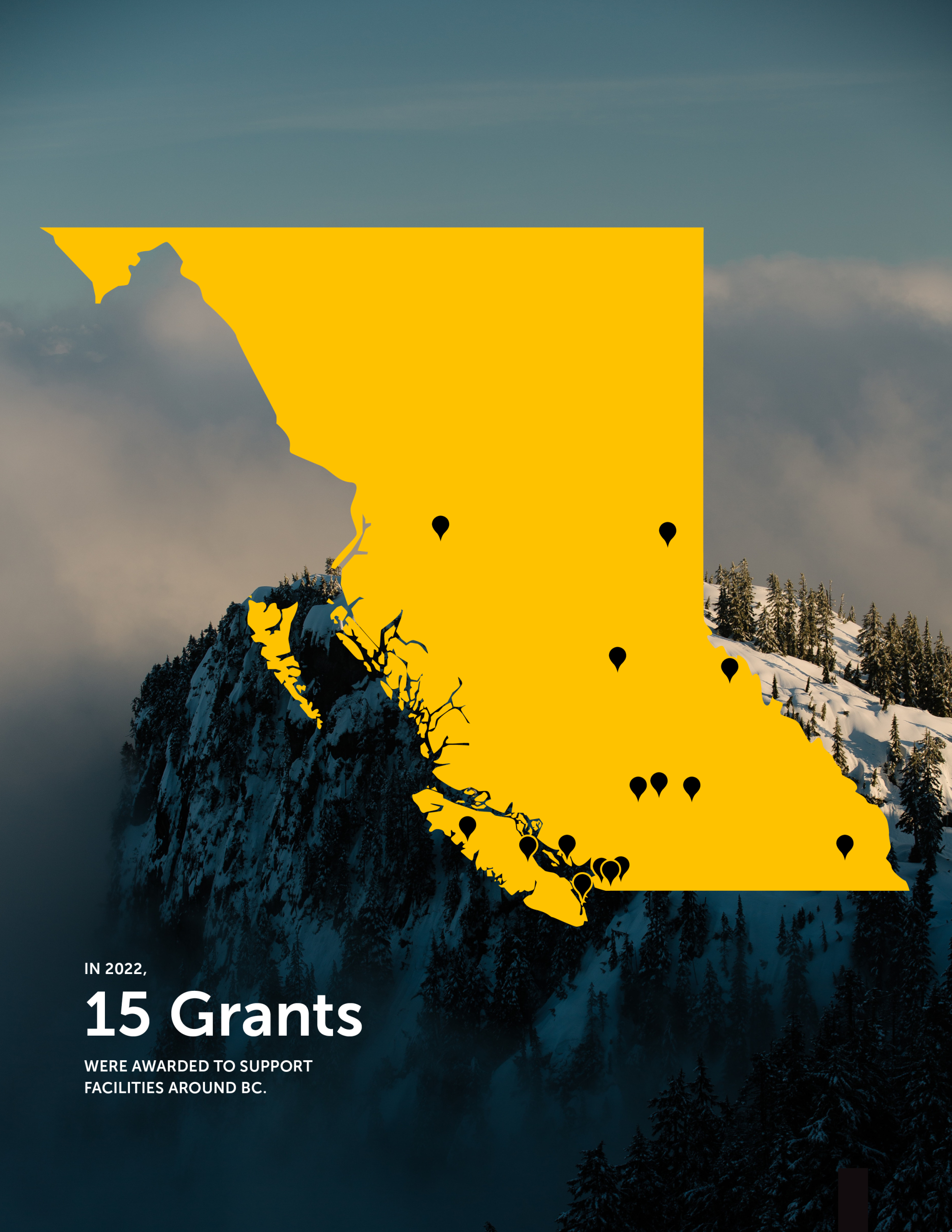
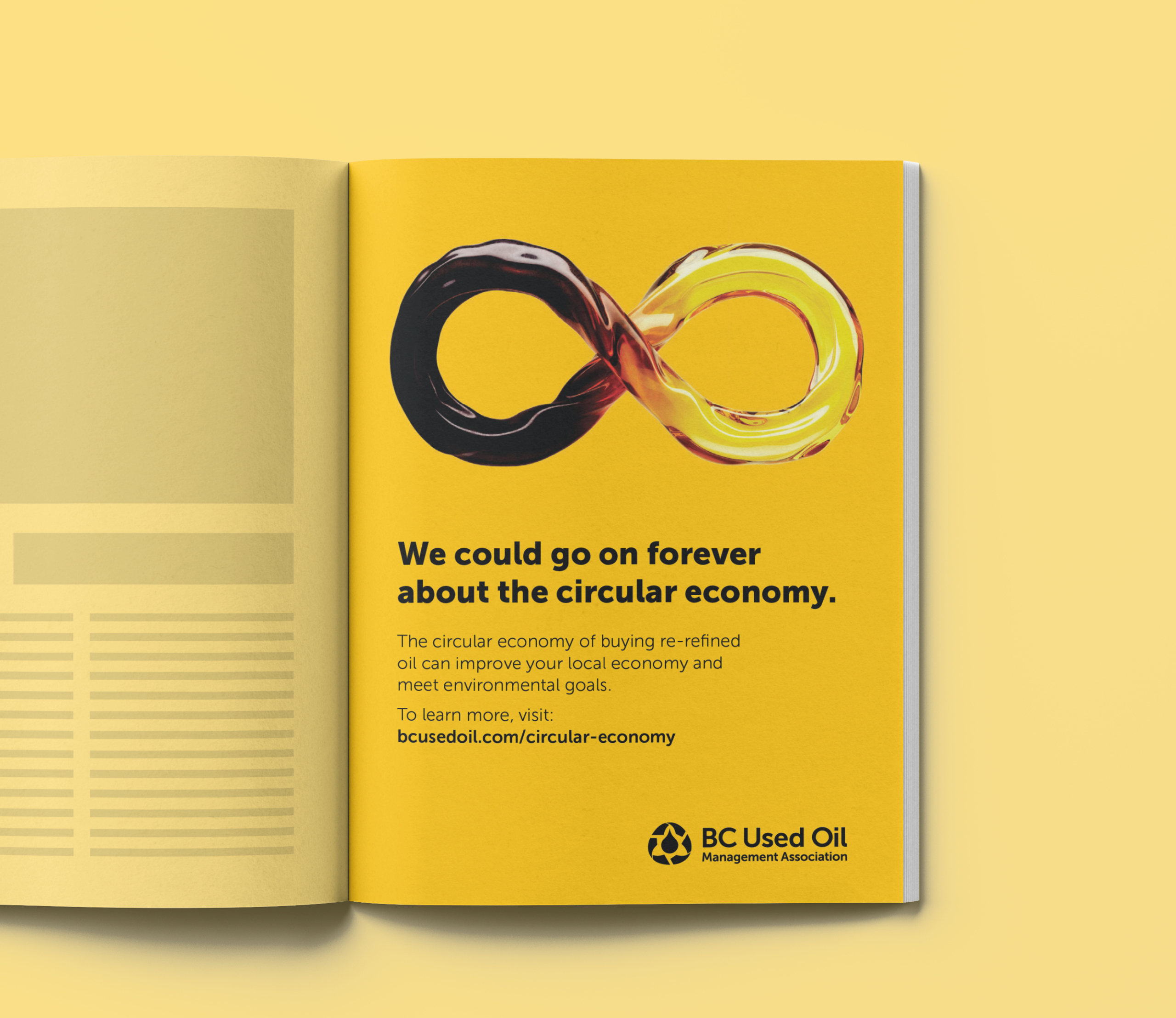
Circular Economy
Nearly every British Columbian directly benefits from the circular economy and as part of our effort to detail the symbiotic relationship of used oil in the circular economy, we launched a program that highlights the benefits of using re-refined motor oil and recycled antifreeze.
On average, of the total materials collected via BCUOMA’s network of registered collectors, 75% of the used motor oil and 100% of the used antifreeze were re-refined and recycled as new lubricating oils and coolant.
There are refineries within BC producing a wide range of re-refined oil and antifreeze products that meet, and often exceed, API, ASTM, OEM, and other engine performance requirements, meaning there is no quality difference when comparing re-refined with virgin products.
Through close collaboration with our key stakeholders, BCUOMA helps prevent automotive fluids and materials from harming the environment and instead, turns them into something useful. Working together we’re improving the environmental and economic outcomes of everyone.
School Programs
For over a decade, BCUOMA has partnered with the ARTist Response Team (ART) to help spread the message about environmental conservation in schools across the province. After moving to a virtual format for two years, we were excited to see this program return to in-person and helped ART provide programming for more than 500 students from kindergarten to grade seven.
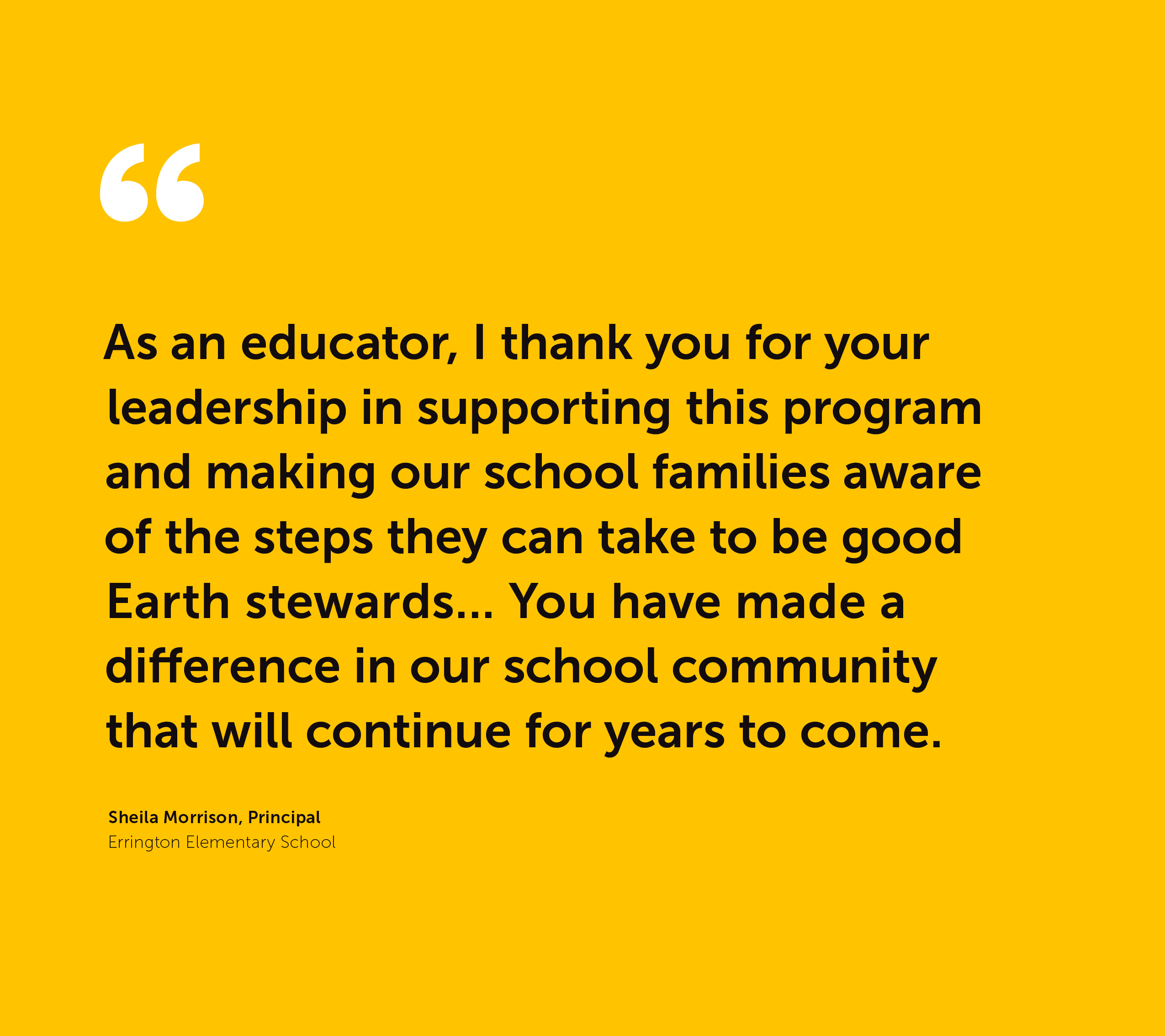
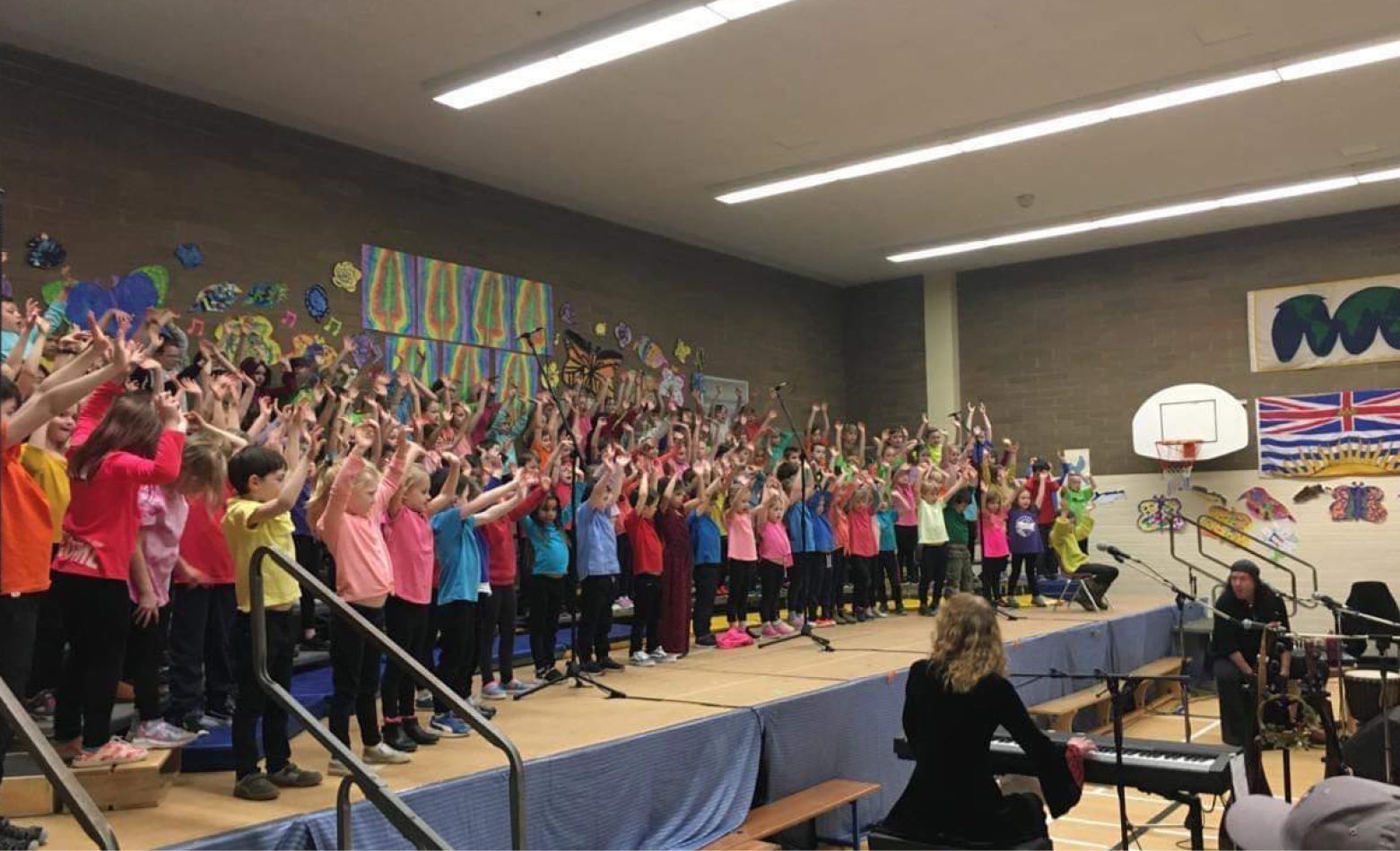
Palsson Elementary School
In addition to the elementary school program, we were proud to sponsor the Chowiyes-Xwithet / Rise Up-Wake Up! concert at the University of the Fraser Valley on Thursday, September 29. This free event, featuring songs, stories and a basket ceremony, honoured the shxweli (“life spirit”) of children lost to residential schools, survivors, and their families. It is dedicated to reconciliation and Halq’eméylem revitalization.
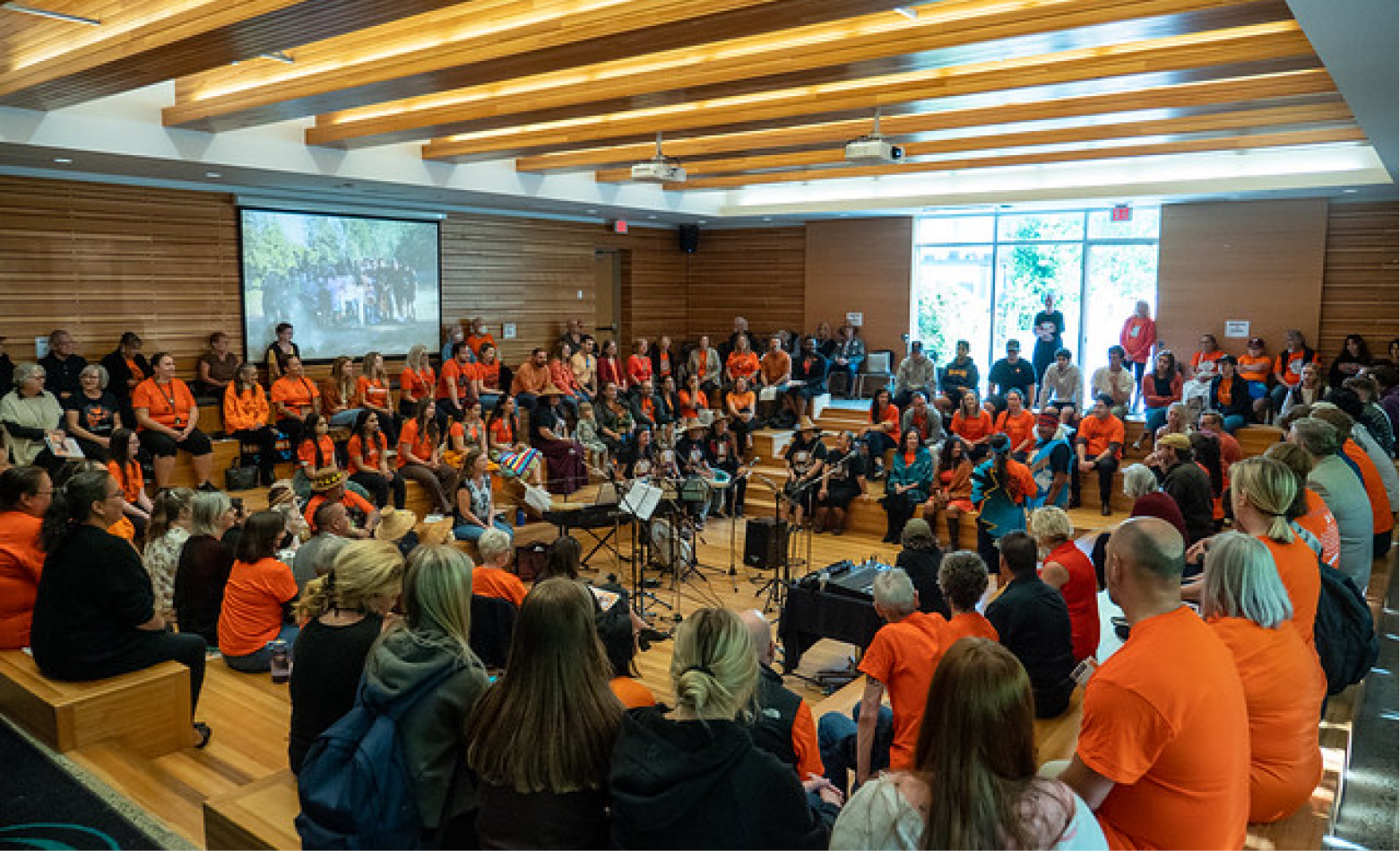
Chowiyes-Xwithet / Rise Up-Wake Up!
COMMUNICATIONS & PUBLIC OUTREACH
BCUOMA uses several different channels to ensure timely and relevant programs are always available to the public. Our communications tactics include:
- Program website with RCF locator tool
- Social Media Accounts (Facebook, Instagram, Twitter, YouTube)
- Traditional media campaigns (TV & Radio)
- Out of Home media campaigns (bus ads, billboards)
- Digital advertising including Google Search
- Media Releases & Interviews
- Community Event Ambassadors
Awareness Campaign
- Length: 6 months, April to October
- Year Round: Google Search & Bus Advertising
- Channels: TV, outdoor, digital, social, search
- Estimated Reach: 53 million+
Public Relations
- 47 Press Releases Sent
- 175 print, digital, broadcast and social media mentions
- Estimated Reach: ~23 million
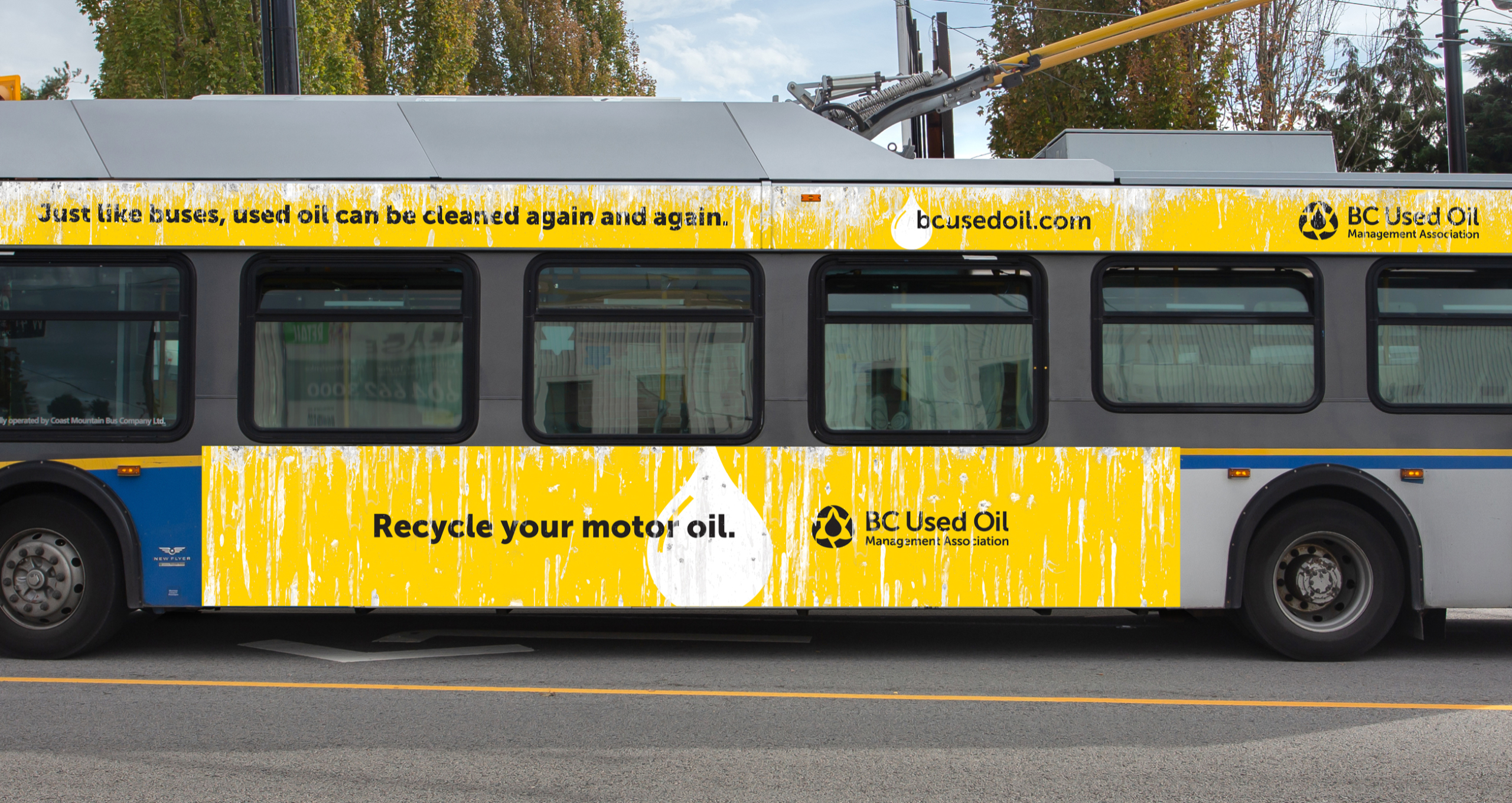
Bus Ads
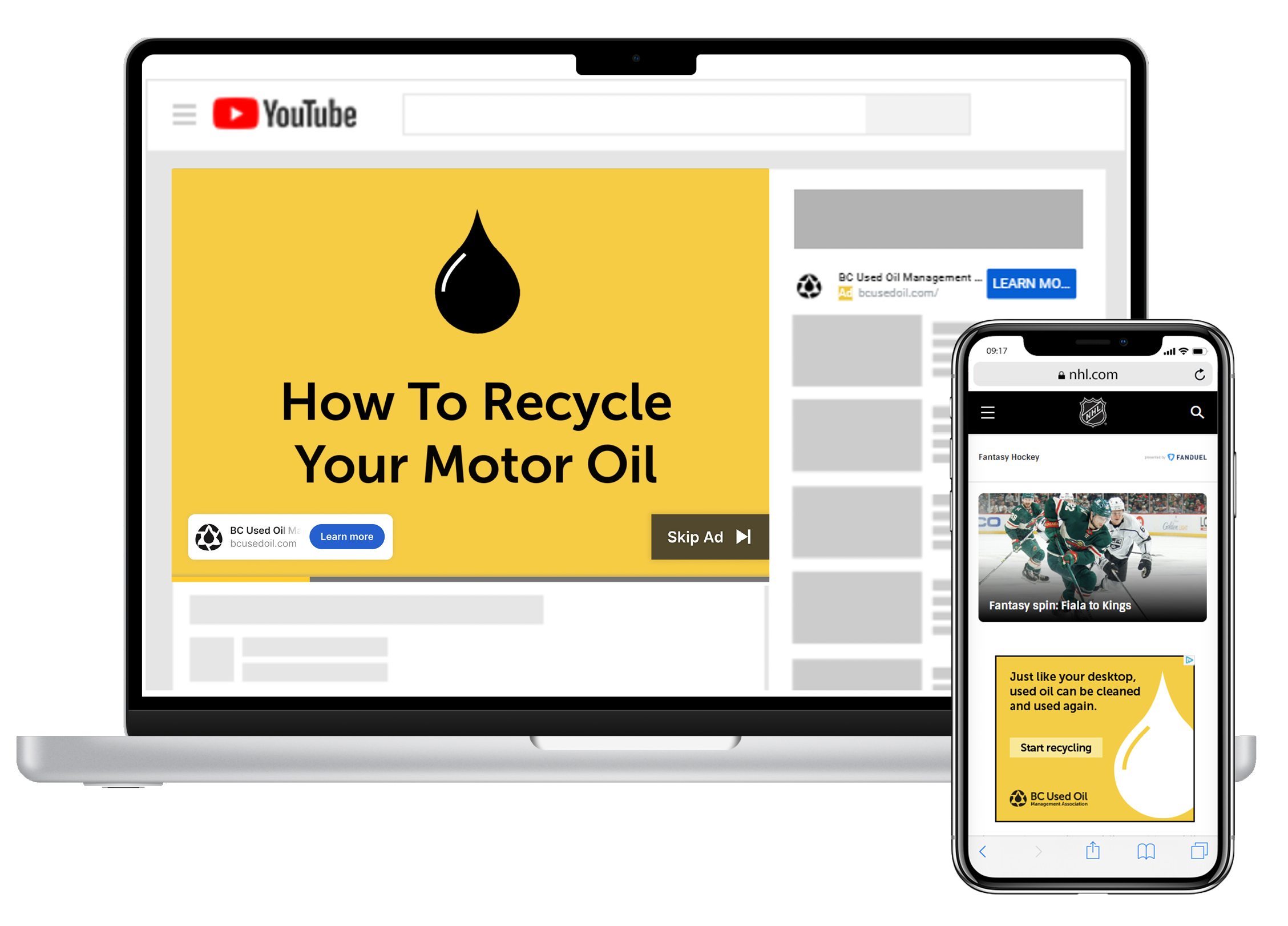
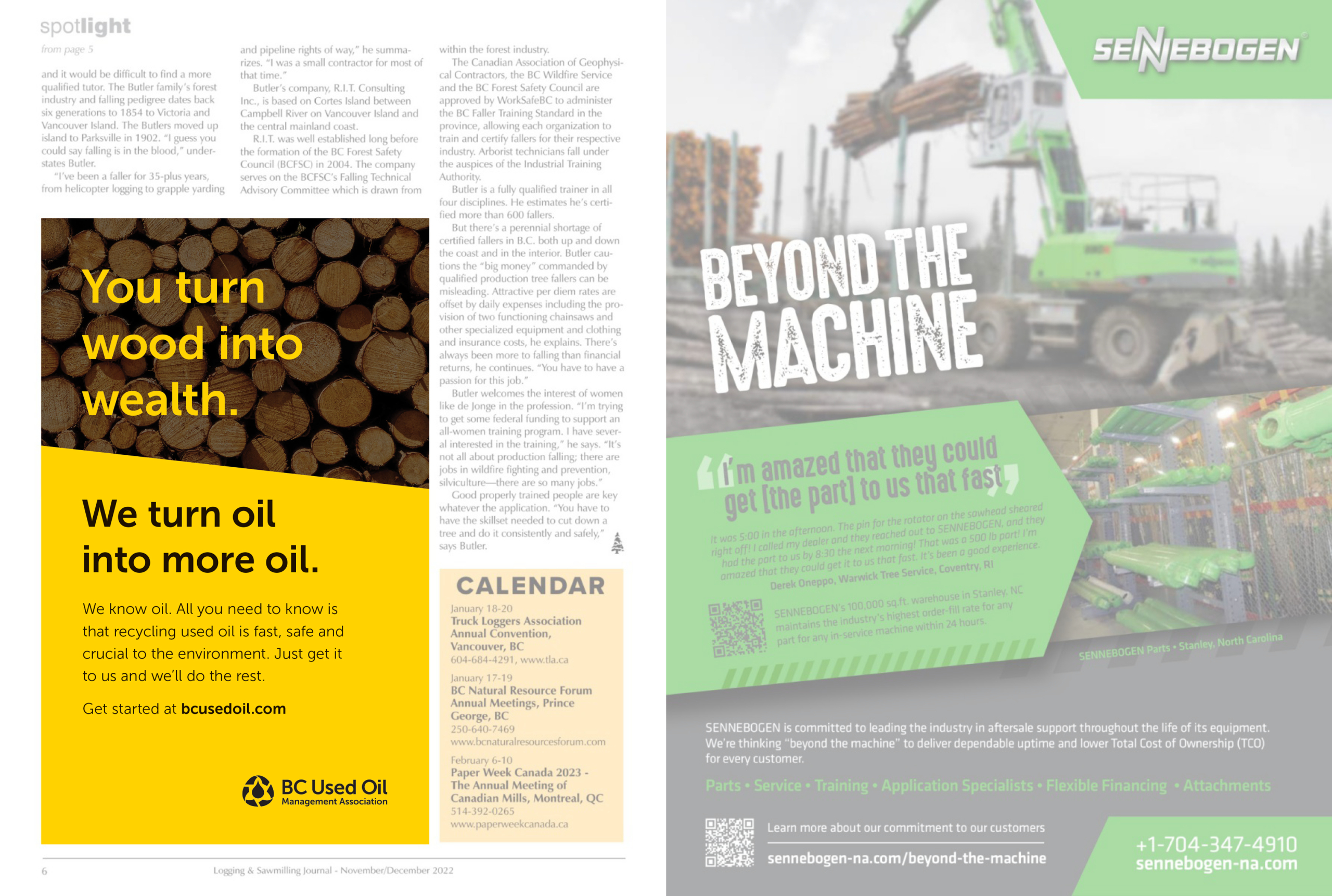
Community Engagement
We sent our ambassadors to eight automotive-focused events across BC from June to September to help generate greater awareness for our program and inform people of the locations of used oil recycling facilities.
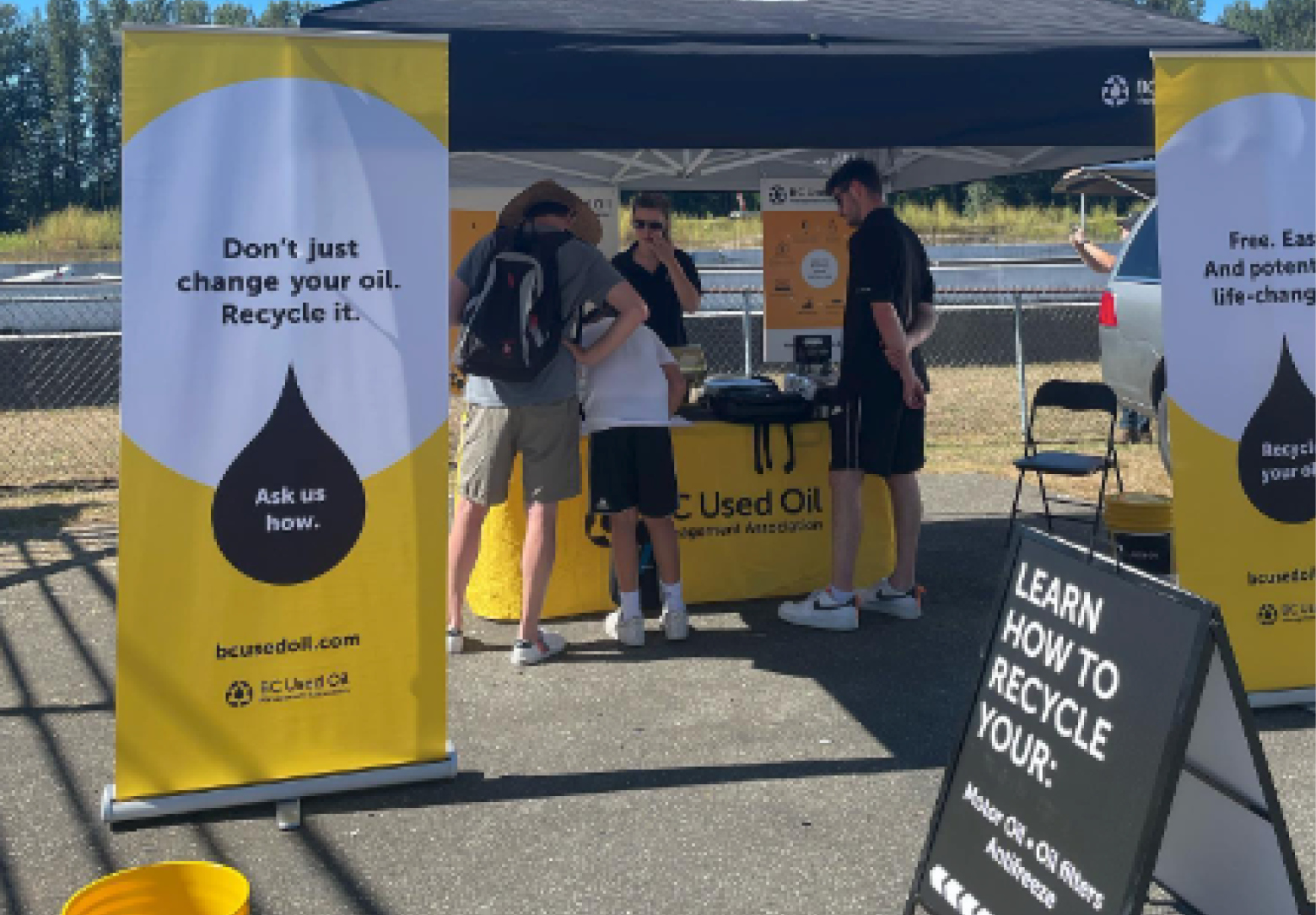
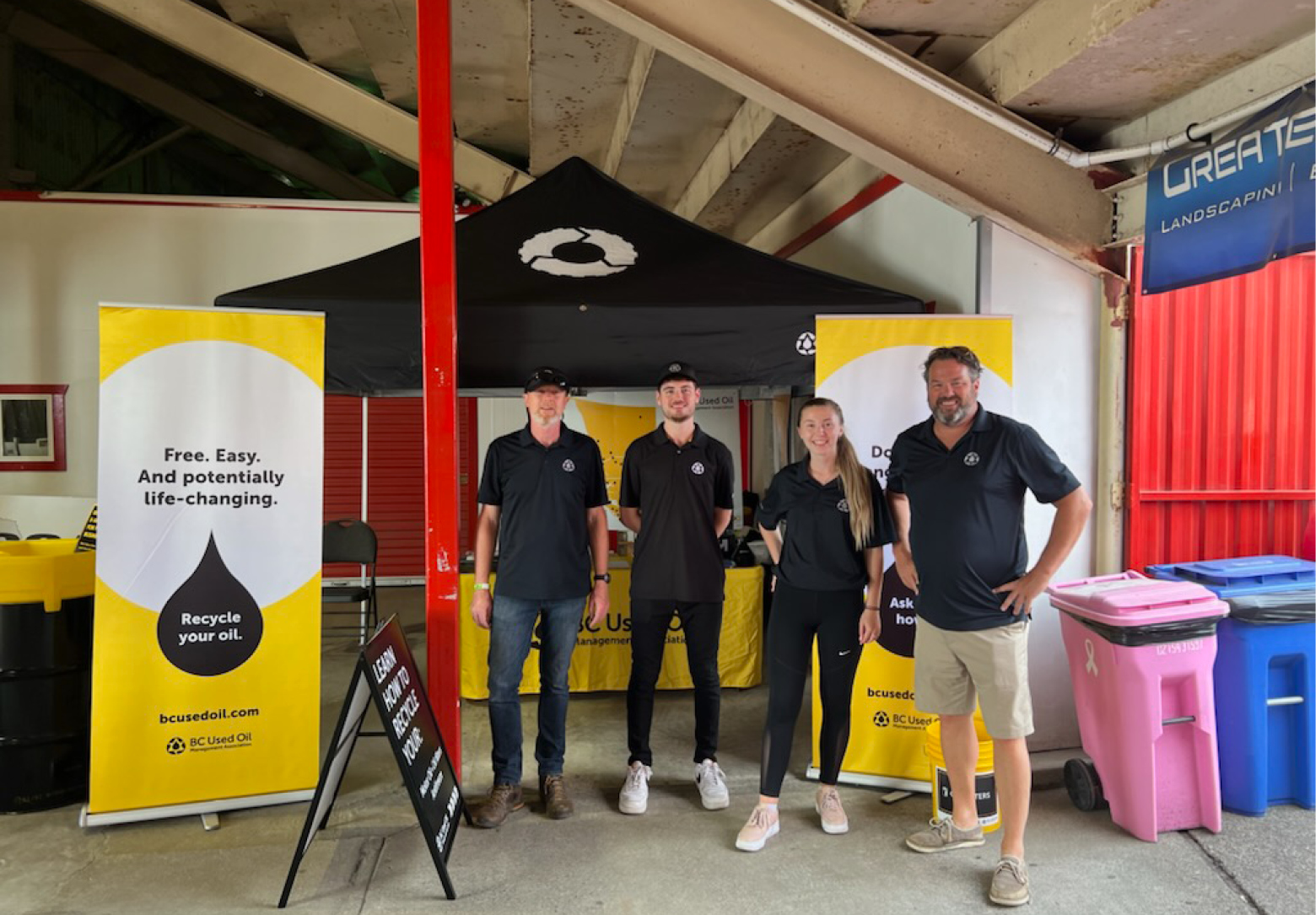
Consumer Awareness
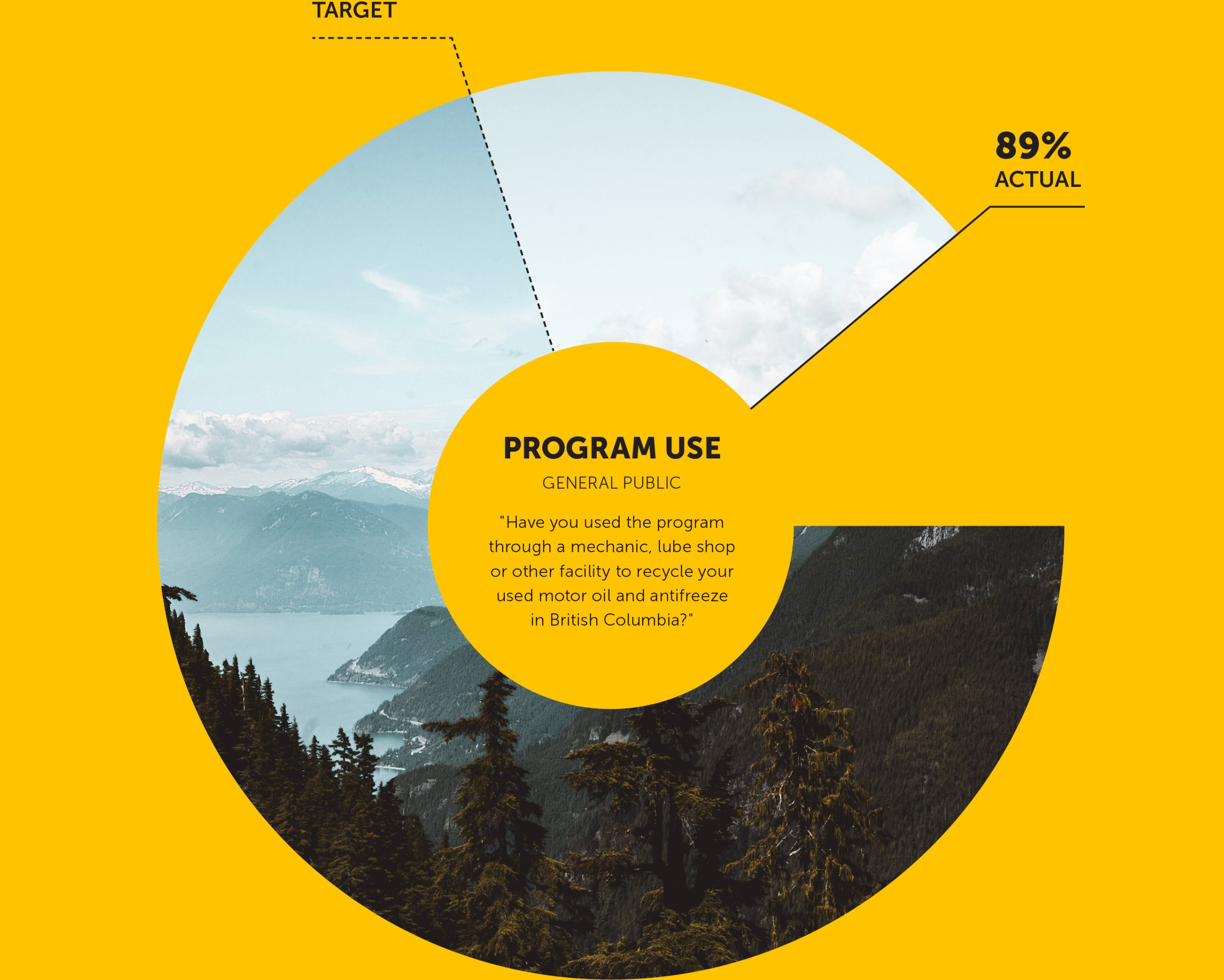
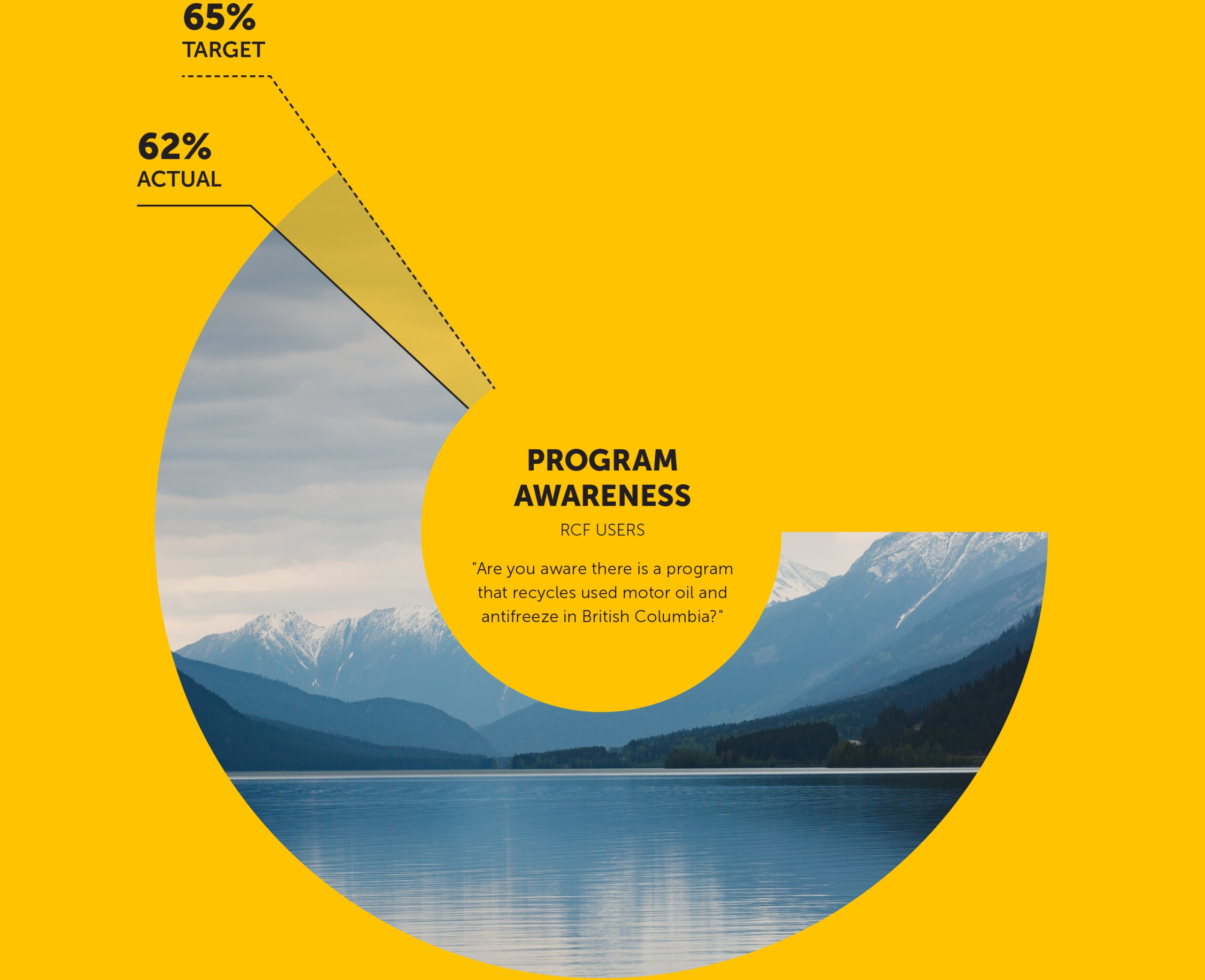
Considering BCUOMA’s high recovery rates and the fact that a majority of the products collected come from commercial facilities, BCUOMA does not believe that “general” consumer awareness as a performance measure is as critical as it is for other, more consumer-oriented products and programs.
As such, our primary focus is on consumers who change their own oil or antifreeze and require drop off at consumer RCFs. BCUOMA uses a combination of social media audience and engagement analysis along with industry and public surveys to help identify these RCF users and target campaigns to that audience. In 2022, trade media advertising for industries such as logging, farming and transportation was also used to help reach RCF users.
In addition to participating in the biennial SABC consumer awareness survey, BCUOMA conducts its own annual survey to determine the level of general program awareness and knowledge of where to find information on drop off locations for program materials. Both surveys are conducted by an independent third-party survey provider and use methodology that includes respondents from all areas of the province and all demographics.
Past surveys show that a majority of vehicle-owning British Columbians actively participate in the program by having their oil changed at a licensed facility connected to BCUOMA’s commercial collection network. As such, the general public awareness target has been adjusted to reflect that and RCF user awareness is reported on separately.
Key Collaborations

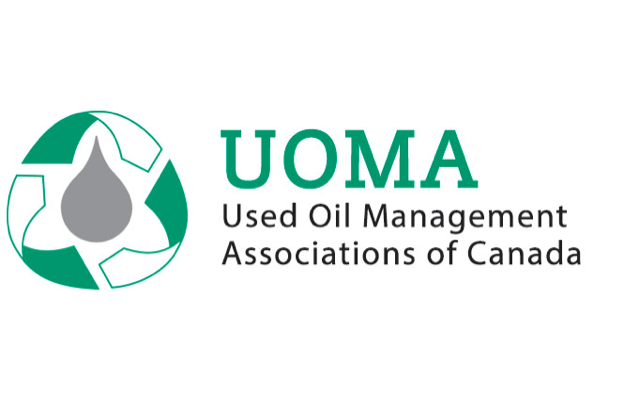
Provincial Programs (UOMAs)
BCUOMA works closely in partnership with eight other provincial programs through the national working group, the National Used Oil Material and Antifreeze Advisory Council (NUOMAAC) which coordinates the Canada-wide used oil and antifreeze materials recycling effort and encourages national standards. The UOMA industry-led stewardship program model works in close collaboration to achieve environmental, economic and socio-economic successes across Canada.
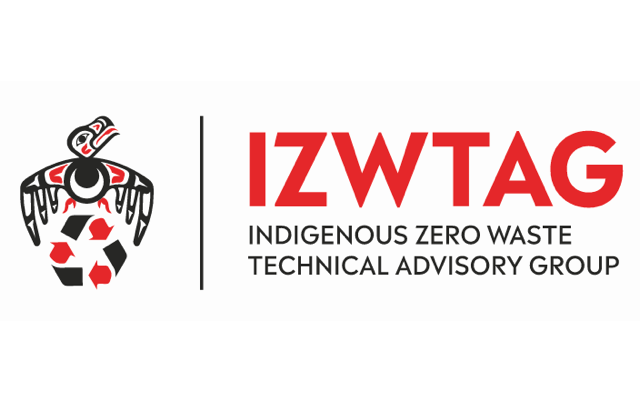
Indigenous Zero Waste Technical Advisory Group (IZWTAG)
BCUOMA is proud to have been the first Associate Member of the Indigenous Zero Waste Technical Advisory Group (IZWTAG), a non-profit society dedicated to supporting zero waste systems in all First Nation communities in BC. We work collaboratively with IZWTAG to ensure used oil and other BCUOMA program products were safely managed in First Nation communities and responsibly recycled.
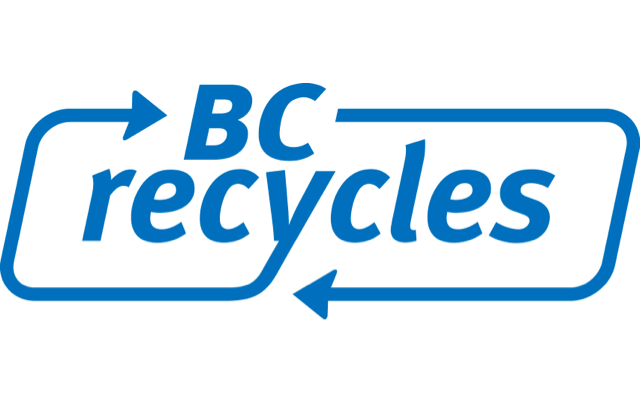
BC Stewardships (SABC)
BCUOMA is an active member of the Stewardship Agencies of British Columbia (SABC), an informal alliance of industry product stewardship organizations. SABC works with government, service providers and other stakeholders to ensure B.C.’s extended producer responsibility model is successful and cost effective.
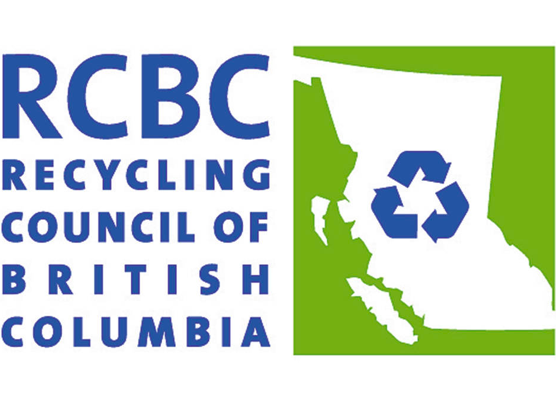
Recycling Council of BC
As part of our commitment to always ensuring access to key program information, BCUOMA participates with other stewardship programs to fund the Recycling Council of BC’s hotline and Recyclopedia database. Consumers looking to have their recycling questions answered can call the hotline at 1-800- 667-4321 or download the Recyclepedia app.
Collection Event Summary
In 2022, BCUOMA was proud to provide funding through our grant program to Regional Districts, municipalities, and other groups to support the following community collection events:
May 26/27 – Oclucje Reserve
Comox Valley Regional District (CVRD)
May 27/28 – Zeballos
Comox Valley Regional District (CVRD)
September 11 – Salmo
Regional District of Central Kootenay (RDCK)
September 24 – Silverton
Regional District of Central Kootenay (RDCK)
October 2 – Kaslo
Regional District of Central Kootenay (RDCK)
October 29/30 – Langley
Township of Langley
These community collection events are a great way for residents to safely return any materials and hazardous waste they have been storing in their homes and are unsure what to do with. BCUOMA is often one of several stewardship programs participating in the event.
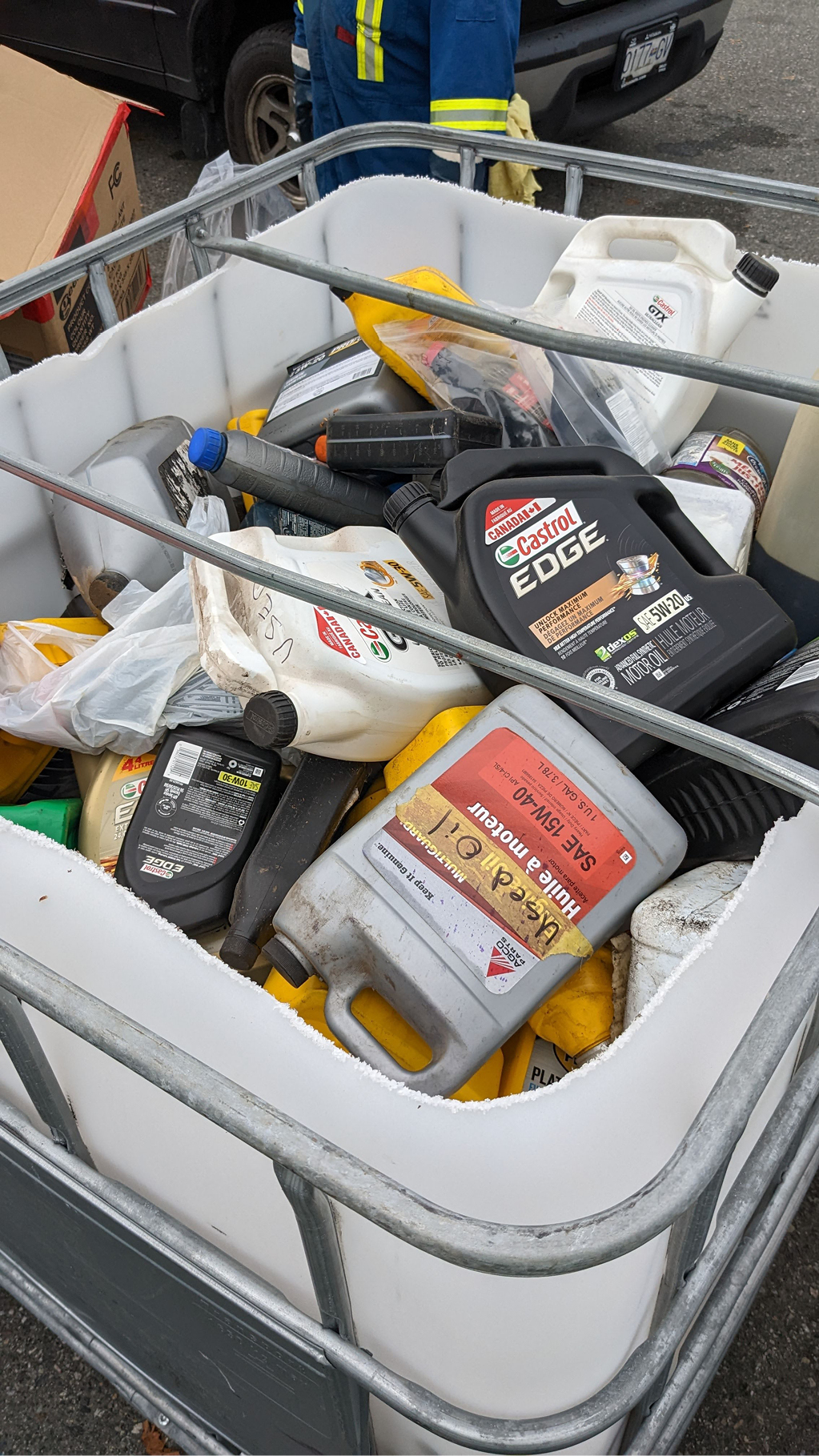
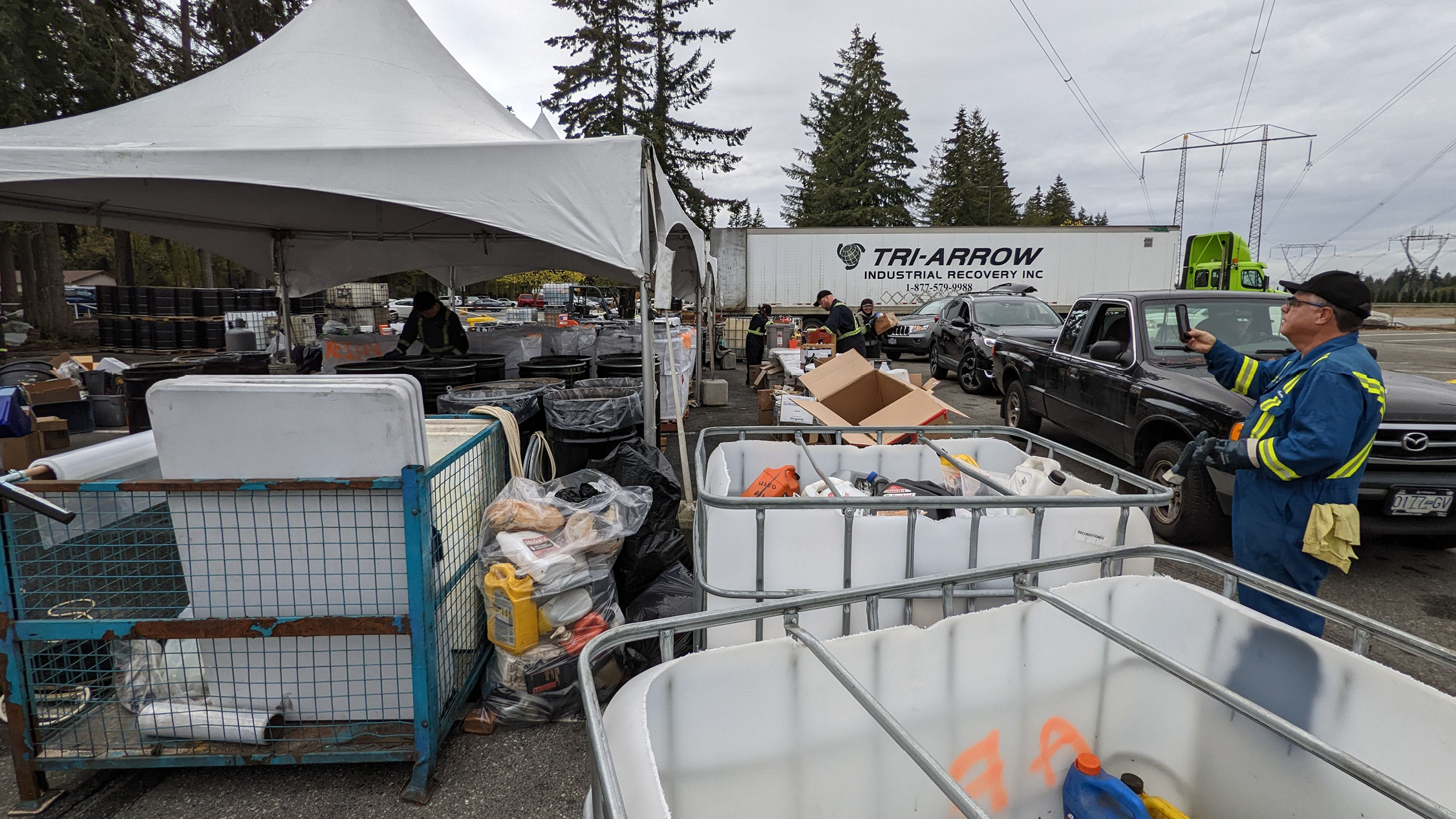
Township of Langley Collection Event – October 2022
Collection Network Performance
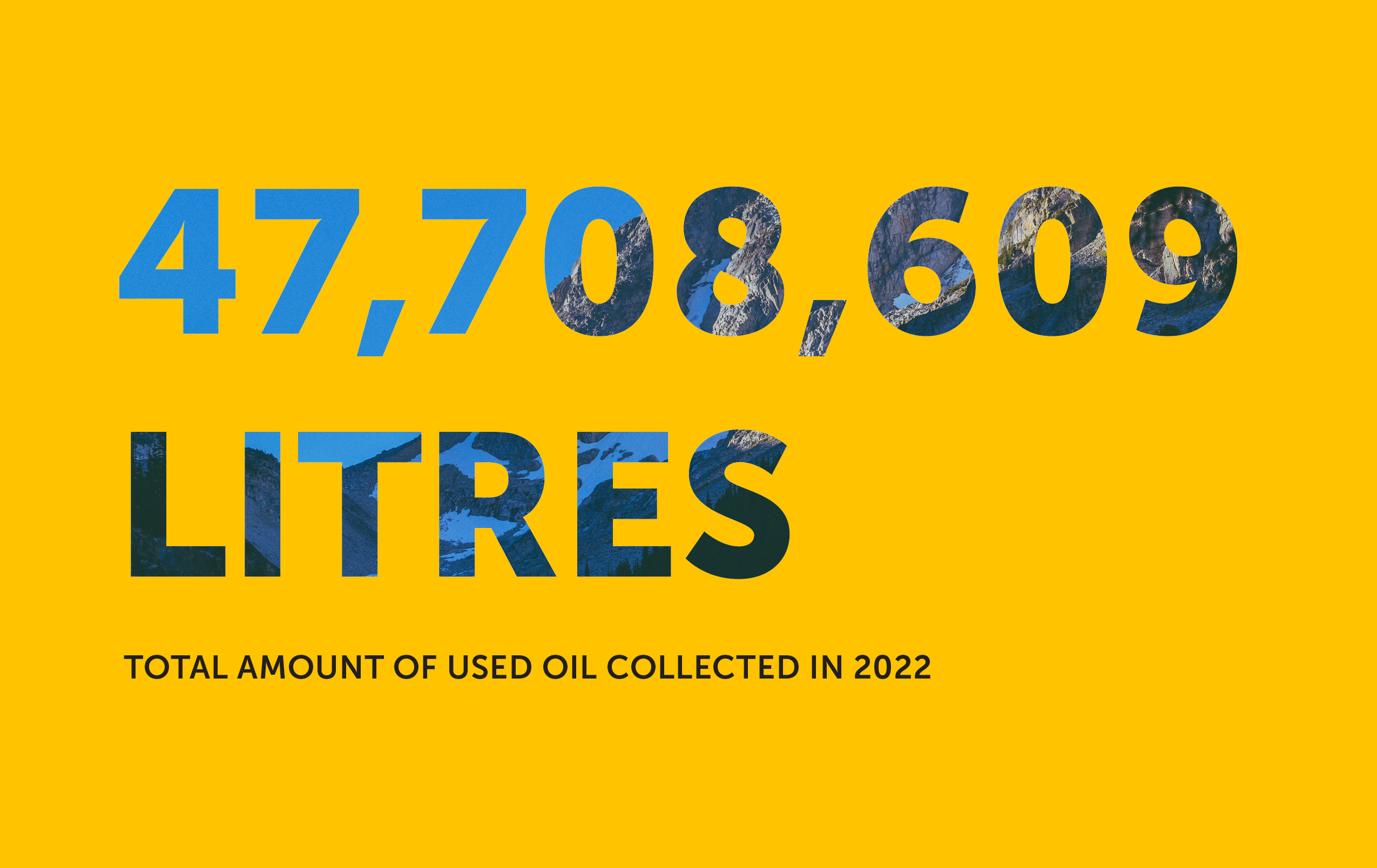
BC Used Oil Management Association is a mature product stewardship program with material collection spread across a large network of generators across nine designated zones in BC. Many of these generators change oil, filters, and antifreeze commercially and then call collectors in the BCUOMA program for pick-up. Any approved end use must be environmentally sound and in compliance with environmental requirements.
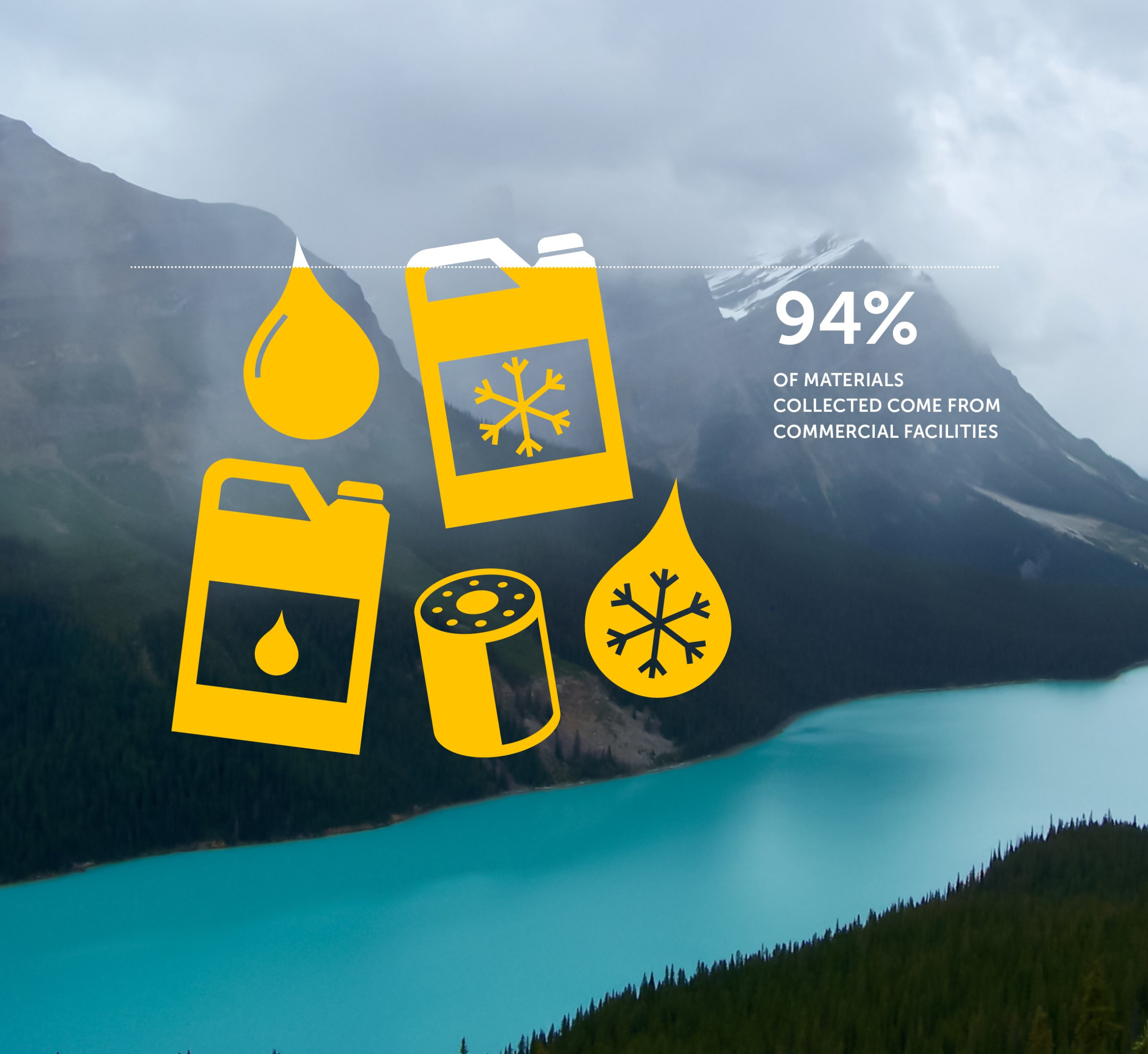
Of all the used oil and antifreeze collected in BC, most (94%) is collected from commercial facilities such as service stations, lube shops and large commercial operations (e.g., mining, forestry and agriculture). These commercial facilities are typically serviced by a registered BCUOMA collector that has a service agreement with that facility.
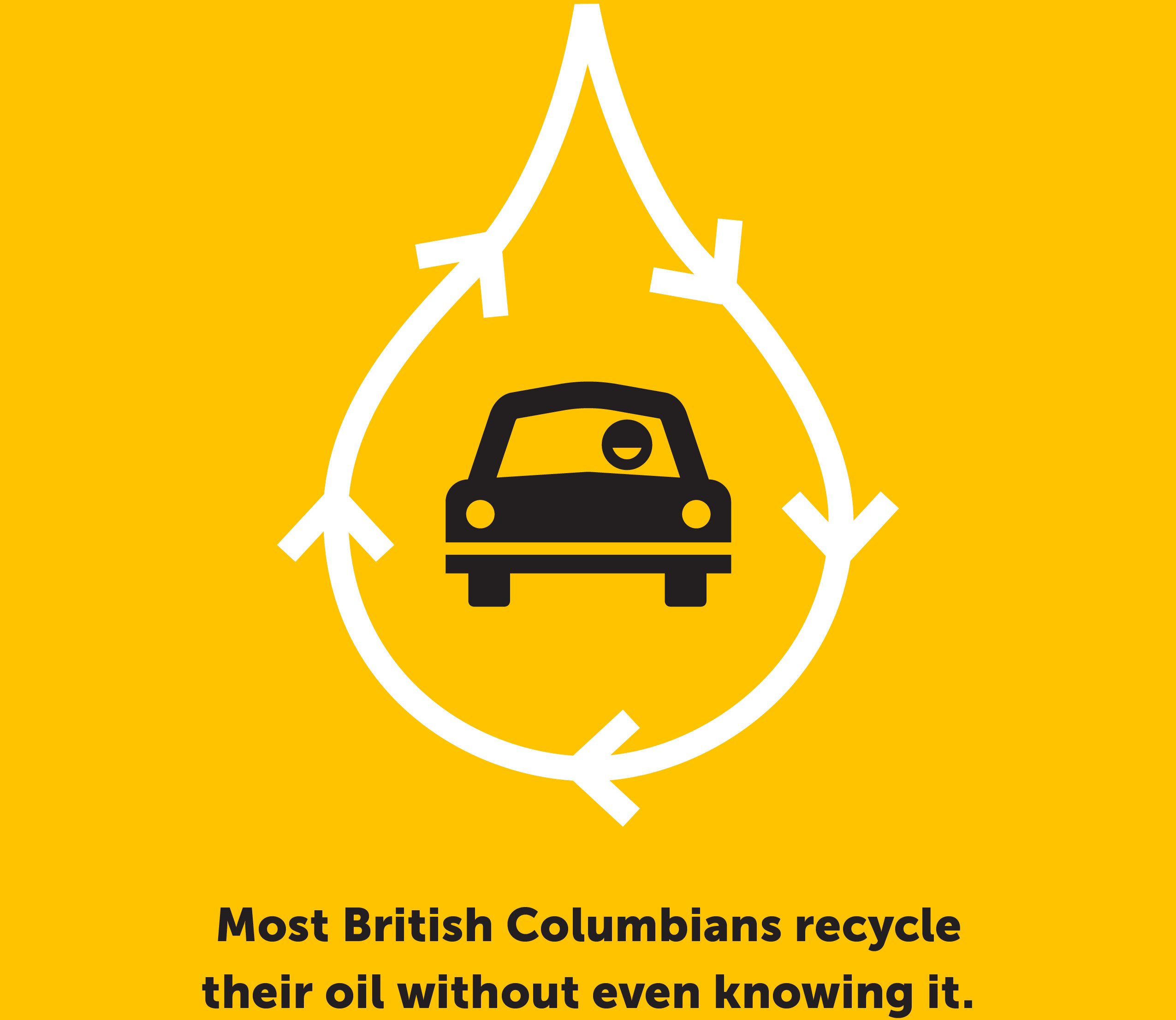
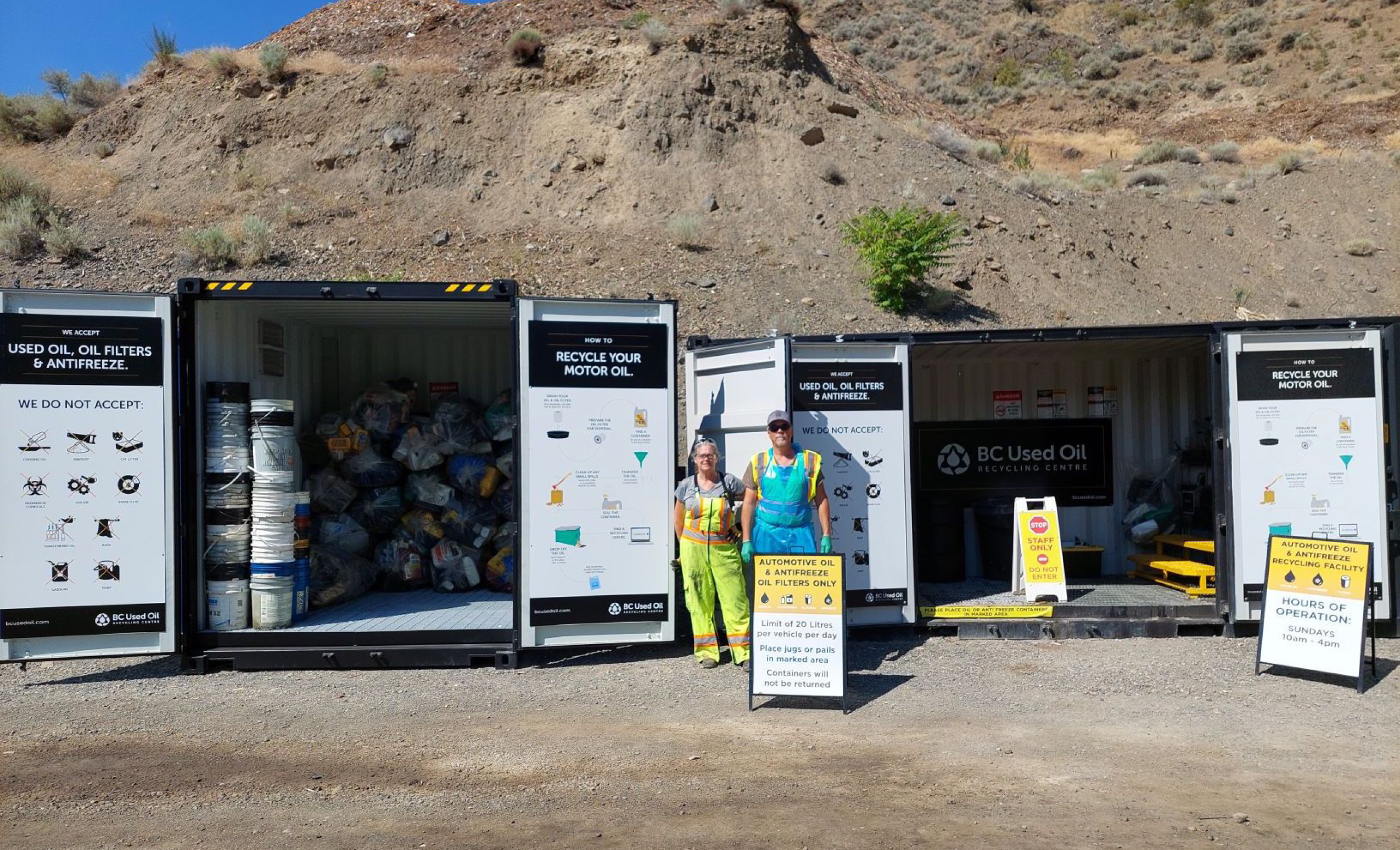
If you get your oil changed at a lube shop or by a mechanic, you are already doing your part to make sure your used oil stays out of the ecosystem. Only a small amount—approximately 6% of the total used oil and antifreeze collected in BC—comes from consumers that change their own oil/antifreeze or small commercial operators that choose to use the free consumer drop-off system.
For consumers that choose to change their own oil or antifreeze, BCUOMA has a province-wide network of registered public recycling centres that provide consumers with free access for recycling of program materials.
In 2022, there were 292 publicly accessible recycling centres located in high traffic retail locations, industrial sites, multi-material private depots (bottle depots) and local government recycling/landfill sites. Each year we look to identify areas of the province that need new facilities and work to find a partner in that area to support. Through the awarding of infrastructure grants, BCUOMA ensures each facility has the right equipment to manage program materials. In 2022, a total of 15 grants were awarded.
| Year | Number of Facilities |
|---|---|
| 2022 | 289 |
| 2021 | 286 |
| 2020 | 273 |
| 2019 | 274 |
| 2018 | 291 |
99.6% of British Columbians currently have reasonable access to a recycling location. BCUOMA continues to work with recycling centre operators to ensure all public facilities are safe and secure by providing grants for new infrastructure such as modified sea containers with spill containment, collection tanks and consumer friendly signs.
Given the low product volumes represented by consumer collection, accessibility to recycling is considered a more meaningful BCUOMA performance measure for this stream than the level of product recovery.
BCUOMA participates in the annual SABC Waste Characterization studies conducted at various local government waste facilities across the province. In 2022 studies were completed in the Capital Regional District and the Regional District of North Okanagan. The results of these studies indicated that insignificant quantities of BCUOMA materials were being disposed of improperly.
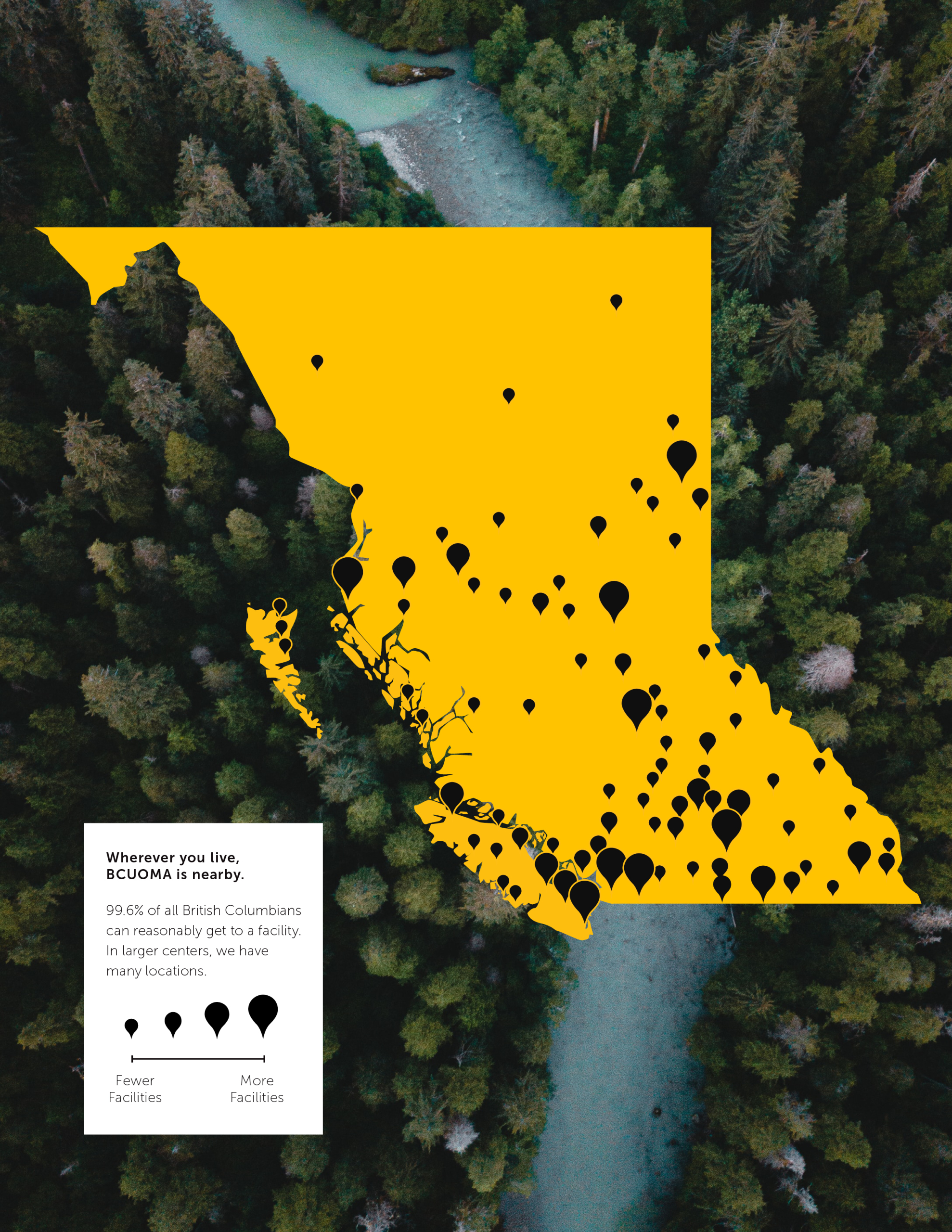
Accessibility
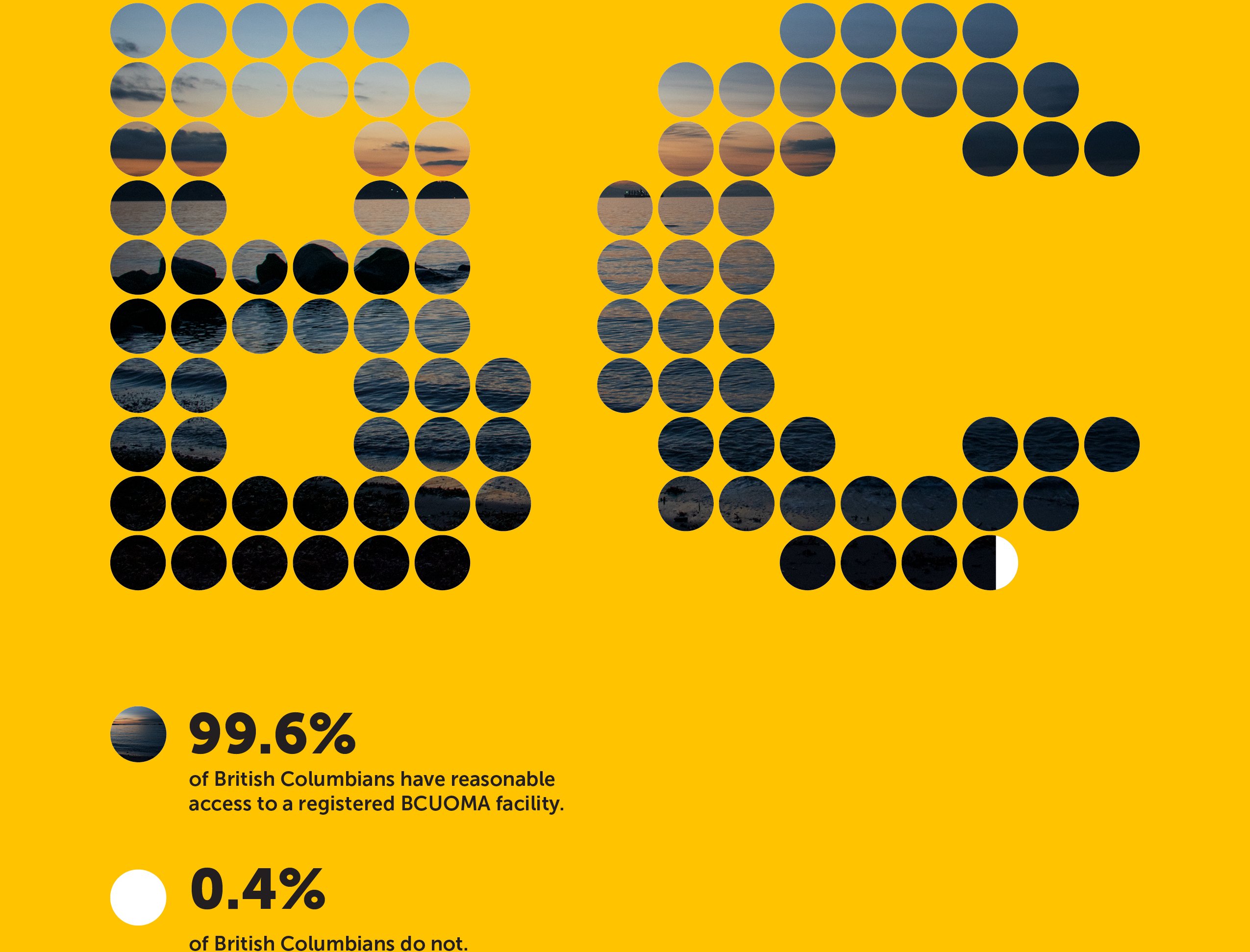
Ensuring that all British Columbians have reasonable access to a registered facility is a key goal for our organization. The BCUOMA accessibility standard has been developed to ensure that at least 95% of the BC population has reasonable access to collection services. This standard is based on the following model:
| Type of Community | Enhanced Service Level |
|---|---|
| a) City, High Industrial | Minimum one facility |
| b) City, Low Industrial | Minimum one facility or one facility within a 15-minute drive |
| c) Town, High Industrial | Minimum one facility |
| d) Town, Low Industrial | Minimum one facility or one facility within a 15-minute drive or collection event |
| e) Village | Minimum one facility or one facility within a 30-minute drive or collection event |
| f) Other | Minimum one facility or one facility within a 30-minute drive or collection event as recommended by IZWTAG |
In addition to our RCF Network, we offer mobile collection services and community collection events as a way to ensure reasonable access to our program.
Capture Rates in 2022
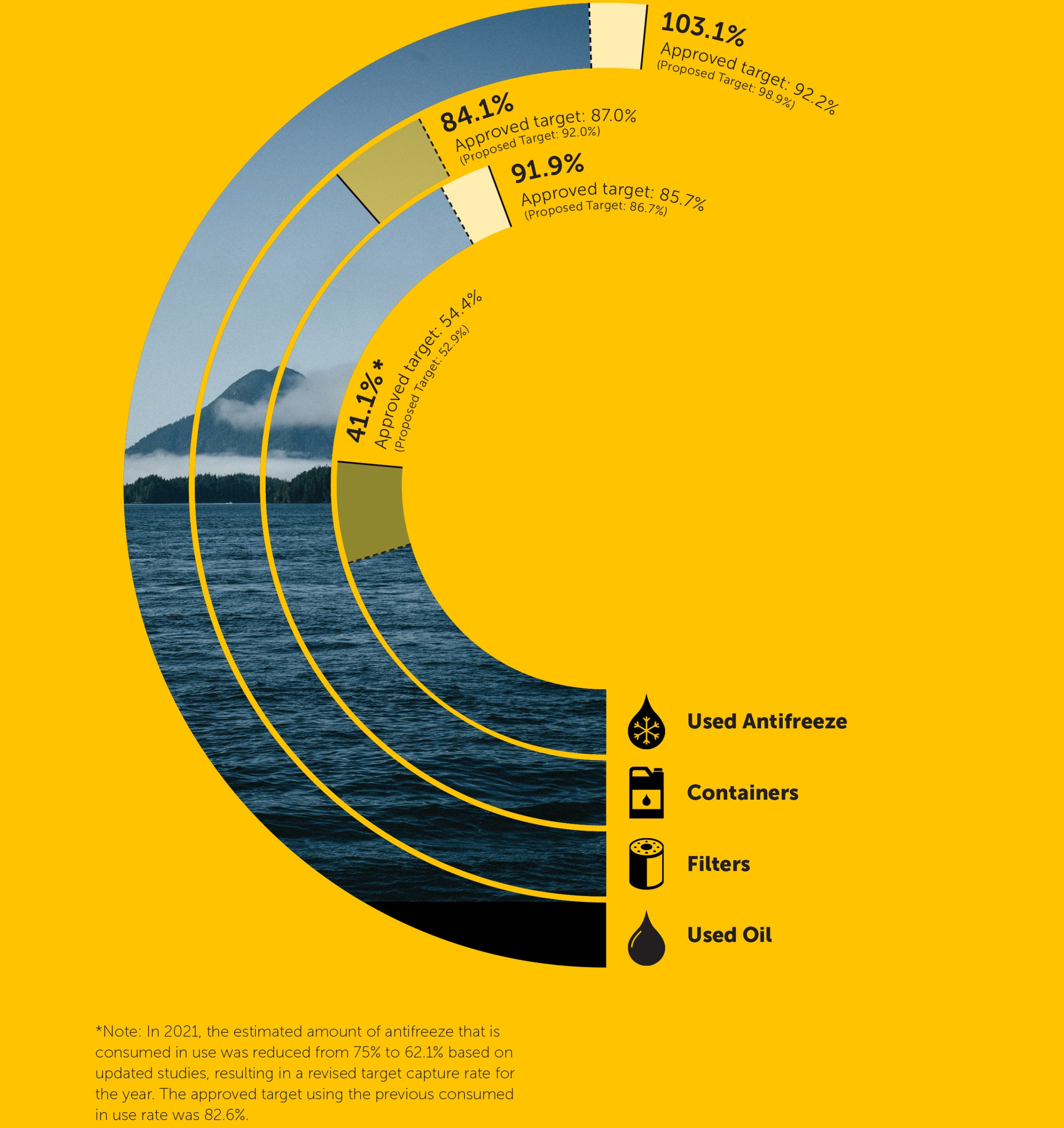
Product Collection
As BCUOMA is a mature program, our product collection numbers have always been stable, consistent and much higher than the 75% identified in the Recycling Regulation.
Absolute collection for used oil, antifreeze and oil filters decreased in 2022 by 3.6%, 14.4% and 11.8% respectively while absolute collection of used oil and antifreeze containers increased by 2.7%. Product sales in 2022 decreased for oil and oil and antifreeze containers by 2.3% and 3.8% respectively while increasing by 0.5% for oil filters and 13.6% for antifreeze.
Used Oil (millions of litres) | Filters (millions of units) | Containers (millions of kilograms) | Used Antifreeze (millions of litres) | |
|---|---|---|---|---|
| Sold (2022) | 89.0 | 6.8 | 1.9 | 14.5 |
| Consumed in use | 26.0 | n/a | n/a | 9.0 |
| Repurposed | 16.7 | n/a | n/a | n/a |
| Available for collection | 46.3 | 6.8 | 1.9 | 5.5 |
| Collected | 47.7 | 5.7 | 1.8 | 2.3 |
| Capture rate* | 103% | 84% | 92% | 41% |
Only a portion of every litre of oil and antifreeze sold is available for recovery because an estimated 29.3% of the oil and 62.1% of the antifreeze is consumed during use and an estimated 26% of oil not consumed in use is re-purposed each year and is not available for collection.
End Fate for Products Collected
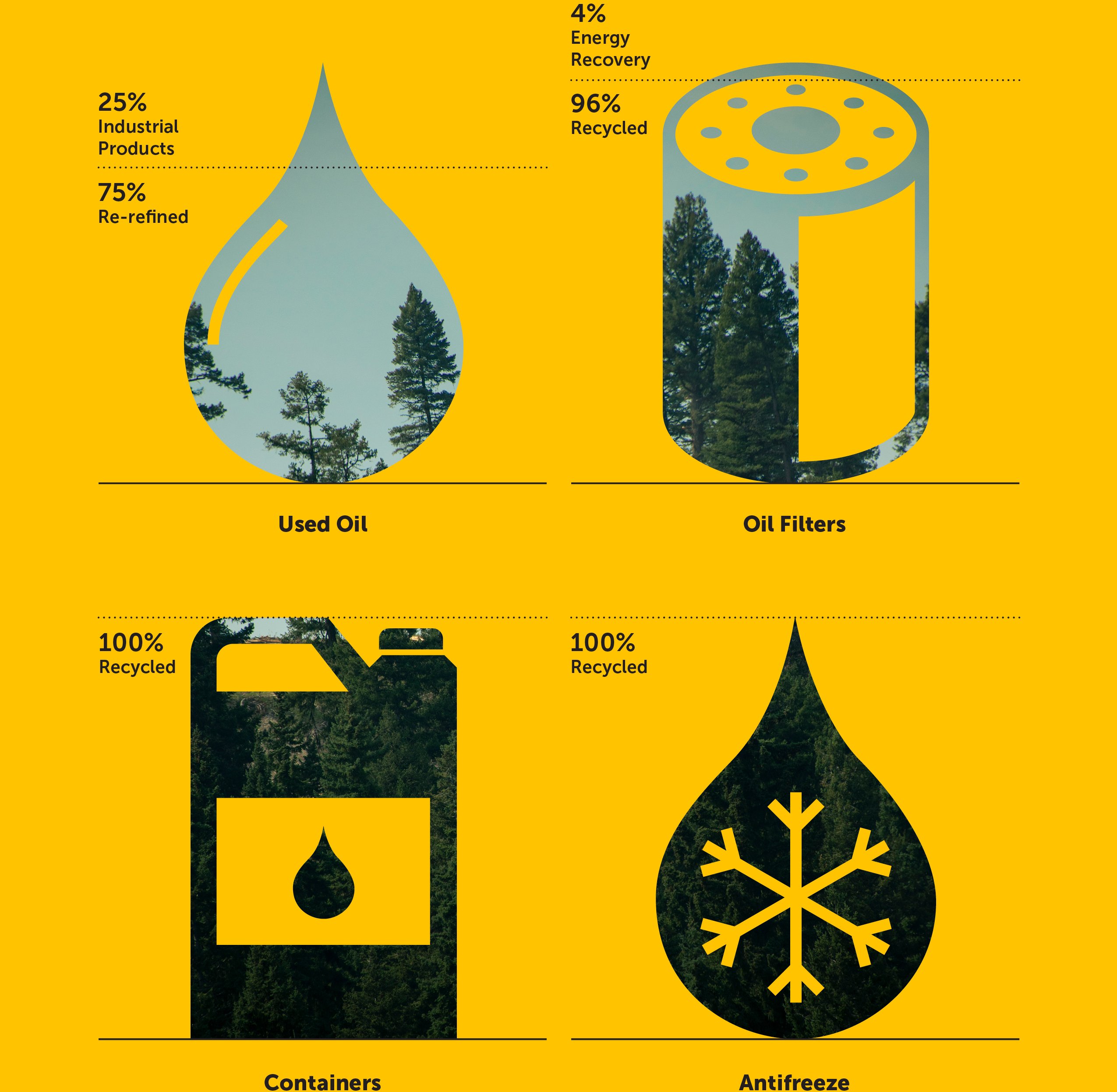
Product Management
Collected products are managed in accordance with the Pollution Prevention Hierarchy as outlined in the BC Recycling Regulation.

Used Oil
Oil previously sold as lubricating oil is collected and re-refined into new lubricating oil. Some oil is collected, transformed and used as an industrial product. This includes re-refining and use as a fuel for pulp mills, cement kilns, asphalt plants and other uses that meet the Hazardous Waste Regulation or applicable government standards in other states or provinces, such as for mining explosives or exploration drilling.

Used Antifreeze
Antifreeze previously sold as an antifreeze product is recycled and reused as an antifreeze product. Antifreeze processors are already actively involved in processing used antifreeze to the point where an additive package can be included, and the recycled antifreeze can again be sold as automotive antifreeze.

Used Oil Filters
Metal filters are collected and recycled into other metal products like rebar, nails, and wire. The paper elements are processed through an oil recovery system with the residual being managed in a waste to energy facility to recover the remaining inherent oil.

Used Oil & Antifreeze Containers
Plastic and metal containers are recycled into new plastic and metal products. BCUOMA are proud of the fact that both used antifreeze and empty containers are processed and recycled at facilities right here in British Columbia. Managing these products locally provides significant environmental, economic and social benefits that support our transition to a more sustainable and Circular Economy.

